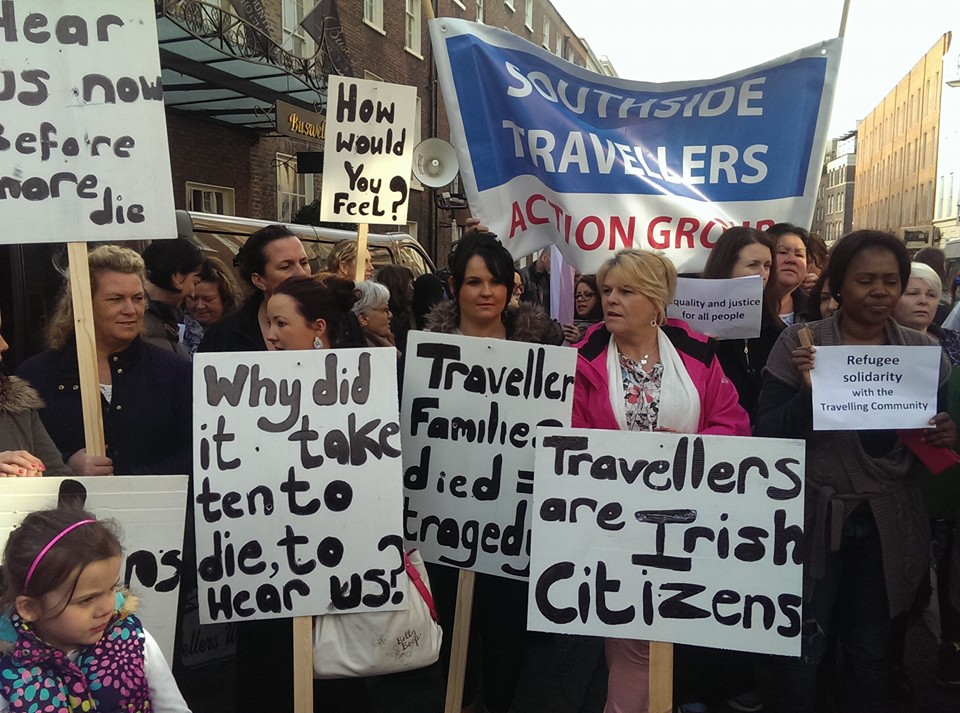Proponents of equality loudly supported the recent campaign for marriage equality and the case is currently being made for reproductive equality by the campaign to repeal the eighth amendment of our constitution. As these campaigns show, legal rights are the means of achieving real equality. This is the way that Irish travellers seek equality in the form of legal recognition as an ethnic minority. Yet many self-identifying liberals who laud equality make an exception in the case of travellers. Moreover, many decry and condemn racism, but in the next breath would tarnish travellers as “violent or thieves”.
Indeed, this type of attitude is present from the top down in Irish society. In 2012, former Minister for the Environment Phil Hogan TD wrote a letter specifically requesting that a traveller family be rejected housing in his constituency, despite their previous dwelling being environmentally hazardous. In a more flagrant example of discrimination, Fianna Fáil Councillor Sean McEniff declared on air that travellers “wreck homes”, before adding “you wouldn’t want it beside you, nor I wouldn’t want it beside me”. This attitude consigns travellers to living in isolation, further separating them from the settled community. After all, what hope is there for integration or mutual understanding if travellers are segregated from settled people?
Legal rights are the means of achieving real equality
Critics point to the high rates of crime in the traveller community as a reason for not wanting travellers living in their community. But if society repeatedly rejects you, of course that will culminate in alienation, deprivation and crime. That very alienation is also represented in the fact that the rate of suicide for travellers is over 6 times that of the settled community, accounting for 11 per cent of all traveller deaths. And while the increased rate of incarceration of black men in the US is often attributed to systemic police racism, a similar acknowledgement of structural discrimination is not granted to Irish travellers. Yet one need look no further than Judge Seamus Hughes’s comment that travellers are “like Neanderthal men living in the long grass, abiding by the laws of the jungle” to see that prejudice against travellers exists within the justice system.
Looking beyond crime, educational attainment is far lower among travellers. At a panel discussion held by the College Historical Society (the Hist) on travellers, TJ Hogan, who is a traveller working on increasing access to education in the community, outlined the difficulties facing travellers in reaching third-level education. He cited discrimination in schools, a lack of awareness of available supports as well as family illiteracy as obstacles hindering young travellers from considering university as a feasible option. In that regard, there are only four travellers enrolled at Trinity, out of a student body of 17,000. Nationally, there are 35 travellers in higher education, with the government’s goal to increase this figure to 90 by 2019. While this would be important progress, it represents a meagre figure when you consider that the government has declared breaking cycles of disadvantage to be one of its important goals for education.
At the panel discussion, Patrick McDonagh, one of the four travellers enrolled in Trinity, argued that travellers should be recognised as an ethnic minority in the Republic, rather than a social group. This is already the case for travellers in Northern Ireland, despite its relative lack of progress on other issues, such as marriage equality and abortion. Some people may consider it paradoxical to grant travellers a distinct ethnic minority status in the name of equality. In fact, this would aid equality for Ireland’s only indigenous minority by protecting them from discrimination. Therein lies the key point in the traveller campaign for ethnic minority status – it is an anti-racist struggle. To that end, both the UN Human Rights Committee and the European Commission on Human Rights have recommended that the Irish government review its position regarding traveller ethnicity.
The key point in the traveller campaign for ethnic minority status, it is an anti-racist struggle
On a practical level, this would improve travellers’ daily lives by making it harder for businesses and individuals to get away with discriminating against them. For instance, Hogan recounted how he is frequently turned away by bouncers after they read the last name on his ID, using drunkenness or “not tonight” as justification, even on occasions where he reported having had nothing to drink. This is just one example of discrimination. Currently in Ireland, the government addresses hate crimes against travellers in an appendix to existing Equality Legislation. This sidelining shows that travellers are an afterthought in current legislation, whereas ethnic status would give them more encompassing protection, as well as showing respect for their identity and heritage.
We are now over a year on from the Carrickmines fire tragedy, an event that took place in my locality and claimed the lives of 10 people, including 5 children. Since the fire, the Dun Laoghaire-Rathdown County Council has relocated surviving members of the Connors family to another “temporary” site, beside a covered dump. Family members have labelled the site a “hell-hole”, with concerns for their respiratory health caused by fumes emitted from the landfill. By any standard, it is clear that travellers are severely marginalised in Irish society. Although legislation will not solve the problem in one fell swoop, ethnic status would serve to recognise traveller identity and prevent racist abuse.







